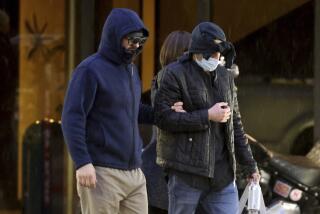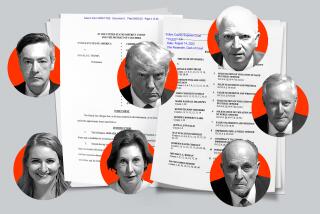The Indictment
- Share via
When a conspiracy indictment is handed down, it’s easy to get lost in the thicket of allegations. That may happen with the 23 counts that have been lodged by a federal grand jury against Marine Lt. Col. Oliver L. North, former national-security adviser Rear Adm. John M. Poindexter and two arms dealers.
Ultimately a trial jury will be asked to decide a dizzying collection of precise and often intertwined questions: Was there a conspiracy to defraud the United States by secretly selling arms to Iran and diverting some of the profits to the Contras? Did the diversion of funds amount to embezzlement? Did North use $4,400 for tires, children’s clothing and other personal expenses? Did he and others lie to Congress and to the Tower Commission? Did the lesser-known members of this alleged conspiracy, retired Air Force Maj. Gen. Richard V. Secord and Iranian-born businessman Albert Hakim, pay illegal gratuities by setting up a trust fund for North’s children?
Some of these issues may even seem trivial, but the fine grain should not obscure the scale of what independent prosecutor Lawrence Walsh has undertaken. He has mounted the most sweeping criminal prosecution of White House officials since the Watergate scandal, in the process attempting to unravel schemes that spanned three continents and reached into the recesses of Swiss banks and nearly a dozen government agencies.
And what he and the grand jury have alleged is a knowing, calculated effort on the part of the President’s closest advisers to circumvent a congressional ban on aid to the Contras by selling weapons to a regime implicated in the kidnaping of American citizens--a scheme that, just incidentally, enriched close friends of the White House aides.
To come this far, Walsh has had to overcome numerous roadblocks, including sustained challenges to his subpoena power and even to the constitutionality of his own appointment under a 1978 ethics law. More obstacles lie ahead, for even before the defendants go to trial they will almost certainly argue that Walsh’s investigation relied on testimony that they gave last summer to the congressional Iran-Contra committee under grants of limited immunity. Walsh has tried to protect his inquiry by methodically submitting the evidence that he has derived independently to federal court, under seal.
Walsh also will have to deal with the unpersuasive defense that North and Poindexter are expected to mount at trial, that these matters don’t belong in a courtroom at all because they involve foreign-policy differences between the legislative and executive branches of government, conflicts over what strategy was best for Central America and, ultimately, for the United States.
North, without argument a dedicated Marine, has defended all his actions, maintaining that he was working for the cause of freedom in Central America, that shredding documents was in the national interest, that lying to Congress was necessary to protect the lives of American hostages in Lebanon. Those arguments went down well with the television audience last summer--inspiring Ollie T-shirts, Ollieburgers and other forms of Olliemania. Soon we’ll see whether they play as well with a jury.
In the weeks ahead there will undoubtedly be debate about how this indictment will affect the remainder of President Reagan’s term, the political fortunes of Vice President George Bush, attempts to revive Contra aid and so forth. We don’t know the answers to all those questions, but it is clear to us that the indictment, at the very least, ought to help President Reagan understand what went wrong in his Administration. The President has consistently said that he could not think of any laws that his aides might have broken. Our advice, Mr. President, is to take a look at this indictment for some ideas.
More to Read
Get the L.A. Times Politics newsletter
Deeply reported insights into legislation, politics and policy from Sacramento, Washington and beyond. In your inbox twice per week.
You may occasionally receive promotional content from the Los Angeles Times.









